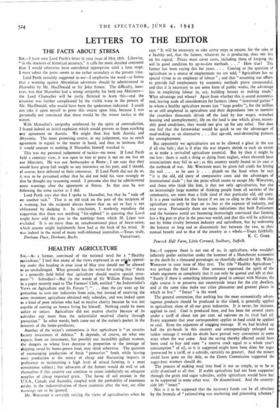HEALTHY AGRICULTURE Ste,—As a farmer, convinced of the national need
for a " Healthy agriculture," I feel that many of the views expressed in an artiEle appear- ing under this heading in your issue of May 21st should not"be allowed so go unchallenged. What grounds has the writer for stating that " there is a generally held belief that agriculture should receive special treat- ment "? Subsidies?—But (in the words of Sir William Prince Smith In a paper recently read to The Farmers' Club, entitled " An Industrialist's Views on Agriculture and Its Future ") " . . then the cry went up for protection to save our industries from ruin, but instead of receiving the same treatment agriculture obtained only subsidies, and was looked upon as a kind of poor relation who had to receive charity because he was not capable of earning an honest living for himself. Nothing could be more unfair or unjust. Agriculture did not receive charity because of its subsidies any more than the industrialist received charity through protection." In other words, both came out of the nation's pocket in the interests of the home-producers.
Another of the writer's contentions is that agriculture is " an unsatis- factory investment of defence." It depends, of course, on what one expects from an investment, but possibly our incredibly gallant seamen, the dangers to whose lives decrease in proportion to the tonnage of shipping saved by home-grown food, may think otherwise. The question of encouraging production of fresh " protective " foods while leaving corn production at the mercy of cheap and fluctuating imports in preference to maintaining a high level of mixed farming, is a most contentious subject ; but advocates of the former would do well to ask themselves if this country can continue to count indefinitely on adequate supplies of cheap imported grain. The havoc of soil erosion in the U.S.A., Canada and Australia, coupled with the probability of enormous strides in the industrialisation of those countries after the war, are alike warnings not to be ignored.
Mr. Worcester is certainly voicing the views of agriculturists when he says " It will .be necessary to take active steps to ensure, for the sake of a healthy soil, that the farmer, whatever he is producing, does not live on his capital. Prices must cover costs, including those of keeping the soil in good condition by up-to-date methods.. . ." How true! The farmer has been saying this for years. . . . Coming to the question of agriculture as a source of employment we are told, " Agriculture has no special virtue as an employer of labour " ; and that " assuming our efforts to provide full employment by economic methods prove unsuccessful, and that it is necessary to use some form of public works, the advantage lies in employing labour in, say, building houses or making roads." What advantage and whose? Apart from whether this is sound economics and, leaving aside all consideration for farmers (those " interested parties " to whom a healthy agriculture means just " large profits "), for the million or so still employed in agriculture and their dependants (not to mention the countless thousands driven off the land by low wages, wretched housing and unemployment), life on the land is one which, given, reason- ably good conditions, they would not give up for any other. Nor does one feel that the farmworker would be quick to see the advantages of road-making as an alternative . . . that age-old, soul-destroying panacea for unemployment.
But apparently we agriculturists are to be allowed a place in the sun if all ;else fails ; that is if after the war imports shrink to such an extent as to make a revival/of agriculture essential. But by then it might be too late: there is such a thing as dying from neglect, when eleventh hour resuscitations may fail to act ; as this country nearly found to its cost at the outbreak of war. Mr. Worcester must be given full credit for hitting the nail . . . as he sees it . . . plumb on the head when he sayi " it is the old, old story of comparative costs and the advantages of international trade " ; but the point which seems to escape Mr. Worcester, and those who think like him, is that not only agriculturists, but also an increasingly large number of thinking people from all sections of the community, are more than a little tired of that particular old, old story. It is a poor outlook for the future if we are to cling to therold idea that agriculture can only be kept on its feet at the ,expense of industry, and vice versa. Fortunately there are many indications that both Parliament and the business world are becoming increasingly convinced that farming has a big part to play in the post-war world, and that this will be achieved, not by bitter rivalry between industry and agriculture, but by redressing the balance so long and so disastrously lost between the two, to their mutual benefit and to that of the country as a whole.—Yours faithfully, Peacock Hall Farm, Little Cornard, Sudbury, Suffolk. K. C, GORE.


























 Previous page
Previous page